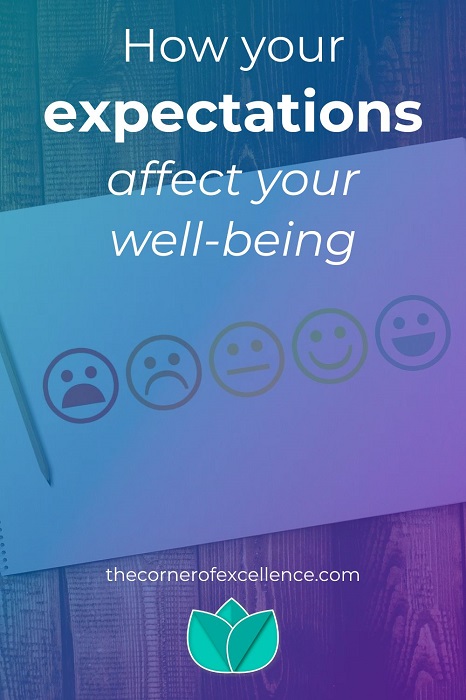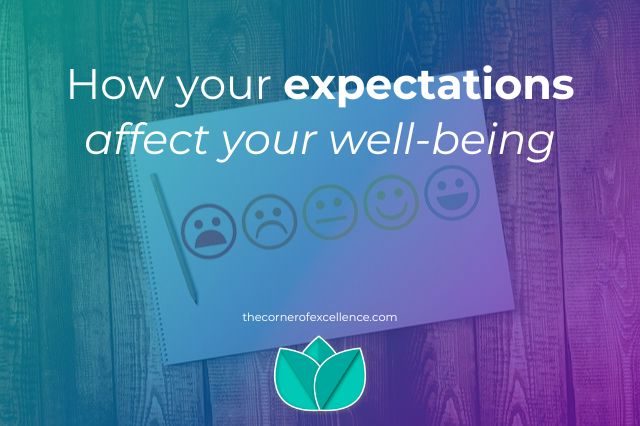Our expectations have a great influence on how satisfied or dissatisfied we feel. Also about the extent to which we get stressed. Let us see why and what to do about it.
The expectation factors
We all have certain expectations about what we want in certain aspects of our life or about how we want others to relate to us. Our education, values and personality shape what we want and how we express it. But our experiences and our environment also have a great influence. However, our judgments of situations can sometimes be wrong. Let us see in which sense.
Our intuition can play a prank on us
Intuition is the ability to make use of all our knowledge subconsciously. Our brain looks for patterns when we are faced with a certain situation and proposes solutions based on our knowledge and experiences. This is how we assess in a few seconds whether we like someone or not. In this way we decide in a matter of seconds whether a situation is favourable or threatening.
The bad news is that our intuition is not infallible. Despite all the knowledge and experiences it is often wrong.

Illusions and enigmas
Take optical illusions for example. Although we already know them, our eyesight will continue to deceive us. The same thing happens with magic tricks. Our vision and intuition interpret a thing even though our logical mind knows that it is an illusion.
Another example is this riddle: A bat and a baseball cost $ 1.10 and the bat costs $ 1 more than the ball. How much does the ball cost?
What has your intuition told you? That the ball is worth $ 0.10? Well, I suggest you solve it as a mathematical problem. Let us see what result you get. At the end of the post I also leave you the solution.
We do not think in absolute terms
Another aspect that influences our expectations is that our mind judges in relation to reference points. It compares situations with often irrelevant standards and references. Which of the gray dots is bigger?

Again, our vision deceives us because, if we measure them, the dots in the centre are the same size.
Thinking of other examples, in competitions the winner of the bronze medal is usually happier than the winner of the silver medal. While the latter thinks that he has not managed to win, the bronze medal winner is happy to have reached the podium.
In this sense, Van Praat & Frijters carried out a study in 1999 in which they asked the participants what salary they thought they needed. They found that as our earnings increase, our expectations about what we need to earn grows to a greater extent.
Other studies also showed that we care more about our situation compared to others than our actual situation. Participants in one study said that it made them less happy if their peers earned more than they did. Another study by Solnick & Hemenway in 1998 also shows this tendency. They asked Harvard students what salary they would prefer:
- Earn 50,000 and the others earn 25,000.
- Earn 100,000 and the others earn 250,000.
Although the second approach improves personal finances much more, 56% preferred the first situation.
We compare with unreasonable references
We also tend to use unreasonable points of reference to assess how well we are doing. According to a 1997 study by O’Guinn and Schrumm, the more people watched television, the higher they estimated the wealth of others but the lower they considered their own. In addition, television consumption also apparently increases household spending in an effort to keep up with others.
According to another study by Kenrick in 1993, the women surveyed rated their bodies better before seeing pictures of models and lowered their scores afterwards.
We get used to things
Another factor to take into account is that we get used to the positive and the negative. Over time the emotional effect of the stimuli diminishes. When you start, for example, in a new job, first it will be exciting. But over time you get used to it and it becomes normal. When we think about how well off or bad off we are, we often forget to compare with our situation before that job that we liked so much when we started it.
The same goes for a salary increase. To this we ought to add the aforementioned: the more you earn, the more you think you need for a living.

We misjudge the impact of things
Ultimately, we tend to misjudge the emotional impact of future events. We overestimate how happy certain things make us like getting good grades in school, getting a raise, buying a house or a new car, etc.
Considering negative situations, our prejudice about the impact is even worse. In other words, our worry and prediction about how bad we will feel is worse than the reality of how bad we feel later. In this sense, a study was carried out on how people would feel after a relationship breakup. They predicted greater pain and distress, and for a longer time, than they later experienced.
But why is it difficult for us to judge and predict? On the one hand we usually focus on an event without considering everything else that will happen in our lives. While you suffer from that breakup, other things may happen to you: a professional success, a fun party with friends, good news in the family, etc. On the other hand, we obviate the previous point: we get used to the good and the bad. And we also tend to use, more or less consciously, mechanisms to make us feel better. Rationalise the situation, do activities that make us feel better or share our feelings with good friends for example.
How do your expectations affect your well-being?
I suggest that you reflect on whether your expectations help you grow as a person and achieve goals. Or, on the contrary, do they detract from your well-being by causing you stress, frustration and dissatisfaction? If the latter is the case, you should review your expectations.
Where do your expectations come from?
When you feel dissatisfied, it is convenient to ask yourself about the origin of your expectations. Are they reasonable? Are they consistent with your values, life situation, knowledge and experiences? Do you take into account that each person is different? Are you considering relevant references?
What or who do you compare your situation with? Are you dissatisfied because you have already got used to the good?
Our expectations and wishes should not be based on what others have or do. They should be based on what is really good for our own well-being and happiness.
Do your expectations affect your well-being?
What effect do your expectations have on your well-being? Do they take away from it or add to it? Which of the aforementioned factors do you think influence you the most?
Solution of the enigma
A promise is a promise, so let us go through the aforementioned riddle. Considering it as a mathematical problem we can affirm that:
bat + ball = 1.10 and
bat = ball + 1
Therefore, we can replace bat in this way:
(ball + 1) + ball = 1.10
And we solve the equation:
2 * ball + 1 = 1.10
2 * ball = 0.10
ball = 0.05

Sharing is caring!




